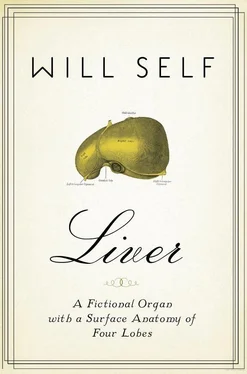Val Carmichael’s funeral was a desultory affair; only the older members of the Plantation Club even bothered to attend. To them Val was. well, something — but to the younger crowd he was merely an ‘old cunt’. Those who live by the cunt, do indeed die by it.
As has been remarked, irony was not an attribute of the Martian; however, please feel free to consider how inappropriate it was for a man with a pig’s liver transplanted into him to be burnt at Golders Green Crematorium. Moreover, why not indulge in a little Schadenfreude as you gaze upon the Dog, the Poof, the Cunt, Hilary and Her Ladyship, who, even in the brilliance of a summer’s day, have the dazed-grey look of ghetto-dwellers about to be relieved of their remaining teeth by Nazis with pliers.
Mark only these two further things. If you feel aggrieved by the way this narrative has moved towards its — frankly sickening — conclusion, proceeding not with straightforward honesty, but waddling through needless digressions and lunging into grotesque interpolations, then all I can say is that it has only been mimicking the Martian’s own perception of humanity. For, where we are confronted with the nobility of feeling, high culture and deep spirituality, he sees nothing but the stereotypic behaviours of anthropoid geese.
Second, if you are inclined to feel bad when you contemplate the cosmic fatuity of a species that exists, in its given form, purely so that a few score individuals may be harvested for their cirrhotic livers, then don’t: self-pity is such an ugly attribute of the human character, and one particularly pronounced in the alcoholic.
Instead, why not return with the other members to Blore Court and climb the two flights of stairs to the green baize door? Take off your coat, throw it over a stool, wink at the Prince Consort, then watch his glazed eyes begin to rove as the Poof pounds upon the piano keys, wrenching the Death March from its dusty bowels.
The gang are all here — all in their allotted places. The Martian would have had to decamp if things hadn’t panned out in Totteridge, but now he’ll be able to stay a while longer. See him sidle up to the bar — and note how attentive young Stevie is.
The Martian orders a round, specifying a triple for Hilary; and, in time-honoured fashion, Hilary pours a bit of his vodka into Stevie’s glass of lager. All is as it should be as they raise a toast to the memory of Val Carmichael: the gavage is under way. It may take a while, it may perhaps seem cruel, but then there’s no finer flavour in the universe than foie humain .
Joyce Beddoes — Jo, to her friends, Jo-Jo, sometimes, in frank intimacy, to her late husband, and also to her daughter, Isobel, when she was a child — wanted to get her head down between her knees.
‘Are you all right, Mum?’ Isobel — who insisted on the ugly sexlessness of ‘Izzy’ — asked her, maybe for the fiftieth time that morning. It was an inquiry, Joyce felt, that was aggressively pleading, devoid of any true concern.
‘I–I just want. ’ She was going to say ‘to bend down’, but the fruitlessness of this desire — the seat was too cramped, she was too frail, and the sound of her own voice, more the hiss and cluck of a barnyard fowl than anything human — overwhelmed anything but the blunt articulation of need itself.
However, that didn’t mean the sentence was incomplete, because Joyce did just want everything: the tray table, the fake tortoiseshell hairgrip in the stewardess’s honey hair, the glossy magazine she could see through the gap between the seats in front. She just wanted that magazine — and what was pictured on it: the corner of a table set for a leisurely breakfast with elegant white crockery, a basket of croissants and a glass of orange juice. Joyce just wanted the shapely hand of the model in the photograph, a hand that held a teaspoon with studied poise.
Instead, Joyce had these things that no one wanted: nausea, sickly-sour and putrid; a painfully swollen belly and a hot wire in her urethra. Overwhelming all of them was a dreadful — near criminal — lassitude.
‘Is it water, Mum, d’you want some water?’ Isobel said; except to Joyce it sounded like ‘warter’, and what was that? A fifth element, a lumpy substrate on which they all thrived and died, like bacteria?
How she loathed Isobel’s affected common accent — it made the young woman ugly or, rather, not young at all any more. She was, Joyce realized, increasingly resembling her father. Isobel had always been Derry’s girl — and that was lovely. For Joyce, the great joy of motherhood had been to discover that the young man who had courted her with Stan Getz 78s and Turkish delight, and who had been as slick and assured as his Brylcreemed hair, was back again; but re-cast, played now by an adorable little girl.
But in the past couple of years Isobel had leapfrogged her father’s mature good looks — his firm dimpled chin, his level brown gaze — and gone straight on to his middle age, when, to be perfectly frank , Derry had run to fat . Isobel, who was only thirty-three, had a dewlap beneath her own dimpled chin. Her brown hair — thick and straight to begin with, exactly like her father’s — had been hacked about and dyed so much that it crackled like candyfloss on her round skull.
No, Joyce didn’t want water — and besides, they had none. At Security their plastic bottles had been dumped in a bin — a sudden scare. And, although Joyce had asked Isobel to go and get some more, it was too late because the younger woman had already spent too long in the ladies.
They had only recently taken off and the plane was still climbing sharply: a tilted tube full of humdrum. At last, Joyce succeeded in wrestling her face to the window. The outside world would, she hoped, play the part of knees: she could press her burning cheeks against cool clouds, take deep breaths of fresh air and quell the nausea.
In the frame of the aircraft servomotors whined, the ailerons jerked, the wings’ tips waggled, rivulets of moisture bleeding across them. Joyce noticed that each pimple of a rivet head was surrounded by a ring of infective rust.
The plane slammed into an air pocket. Joyce gasped, then clamped her hand to her mouth, imprisoning the metallic bile that had sprung up her throat. Down below, way below, wheeled the English Midlands, their jigsaw of brownish towns and greenish fields bucked and then scattered. Joyce saw the slick beading of row upon row of new cars, fresh off a production line. Thousands of feet yawned between her wasting flesh and their toughened windscreens; she was — she realized, as once more the plane rocked and rolled — absolutely terrified.
Terrified of plummeting into a superstore’s car park on the Coventry bypass. Terrified of her meagre hand baggage — a change of underwear, useless make-up, unspent money — being strewn over a rutted field. Terrified of being disembowelled by a pylon, or her limbs amputated by humming cables. Terrified, despite her, of all the forty-odd passengers on this flight from Birmingham to Zürich, having the least reason to fear death.
Even so, Joyce hunched up whimpering, while self-made homilies — What will be, will be — came to her parched lips. Joyce wanted her distant and yet jovial father — one side of his face bulgy with the gutta-percha used to replace the cheekbone that had been pulverized in France, the other smoothly benign. Joyce wanted to be on his knee, in a dappled woodland before the Second World War. But he was dead — her mother and Derry, too. And there could be no comfort in the arms of the dead: you couldn’t feel them — and they felt nothing.
Читать дальше












